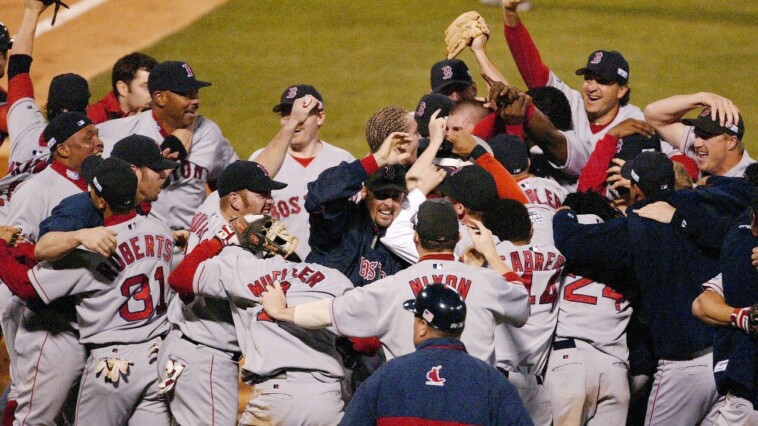-

Howard Bryant, ESPN Senior WriterOct 27, 2024, 09:00 AM ET
- Senior Writer, ESPN
- Author of “The Last Hero: A Life of Henry Aaron”
- Author of “Juicing the Game”
- Author of “Full Dissidence”
AS A KID WHO grew up in the Dorchester section of Boston, the Red Sox were everything to me. We played baseball in a vacant lot off the corner of Callender and Lucerne streets. One of the bigger kids who batted left-handed would shout “Yaz!” after sending a blast across the street — hitting it across Callender was a home run — as a daily ode to Carl Yastrzemski. We were a bunch of grade schoolers contorting ourselves into geometric shapes trying to copy Luis Tiant, the great right-hander who died Oct. 8.
That World Series year, 1975, was my first big memory of the Red Sox. I was 6, and three years later, our fifth-grade teachers rolled televisions into our classrooms so we could watch the start of the one-game playoff between the Sox and Yankees before the afternoon school buses arrived.
The ’75 team was about joy. There was a lament for not winning, but there was no fear, no dread, no choke.
Then came 1976. And 1978. And 1986, when the collapse was so devastating that it affixed itself to the past and became a curse — proof that losing was both predestined and punishment for past sins. One historical narrative transitioned into another.
“The Comeback,” directed by Colin Barnicle, is a documentary commemorating the 20th anniversary of the World Series-winning 2004 Red Sox. It debuted on Netflix this week. I served as an executive producer on the project, and the experience evoked emotions and revelations about the significance of those clashes two decades removed from the fight.
I have always lived between two worlds. As a kid, I rooted for the Red Sox and, because Dave Winfield was my favorite player, the Yankees too. From 2001 to 2005, as an adult, I covered the Yankees first for the Bergen Record and then the Red Sox as a columnist for the Boston Herald.
Time ages all of us, in some cases a bit more easily; Theo Epstein and Kevin Millar, Joe Torre and Roger Clemens don’t look twenty years older. For others, the years have been hard; health issues have taken their toll on Curt Schilling. With some others, time took away everything: Tim Wakefield, Jerry Remy, Larry Lucchino, Dave McCarty, Johnny Pesky and Tiant have died in the years since.
Revisiting the era two decades later, one night in particular encapsulated the entire two years Red Sox owner John Henry referred to as “an epic quest”: Game 7 of the 2003 American League Championship Series.
There are too many memories and moments to recount, but Game 7 of the 2003 ALCS is the best baseball game I’ve ever witnessed live. Perhaps this is nonsense because I was also in attendance when Luis Gonzalez won the 2001 World Series for Arizona in Game 7 against Mariano Rivera. I was also in attendance 10 years later, when the Texas Rangers erased the 1986 Red Sox from the record books, replacing them as the team that came closest to winning a championship without actually winning it.
So, perhaps it is all hyperbole, but I stand by it. Here are seven stories from my experience covering Game 7 of the 2003 ALCS made that night unforgettable.
ACT I: Willie Randolph
I BELIEVED the Red Sox would win Game 7. I had no inside information, but nothing about the 2003 Red Sox made me believe they couldn’t handle the moment. They wouldn’t get devoured by their nerves, as Oakland did against them in the division series. The Red Sox hit exceptionally well in Yankee Stadium and had won Game 6 facing elimination with a late rally the night before.
Walking onto the field, I spotted Willie Randolph chopping fungoes to his infielders. Randolph had won World Series titles with the Yankees in 1977 and 1978 as a player, and four more as a coach during the Torre dynasty. He summoned me over while he worked.
“Young man.”
“Hey, Willie.”
“What do you think about tonight?”
“I think the Red Sox are really good. They might even be better than you this year.”
Randolph did not break stride, easily slashing grounders across the diamond. He nodded slowly.
“Yeah, the Red Sox are good,” he said. “They might even be better than us. But I’ve been around here a long time, and every time we’ve had to beat them, we’ve beaten them.
“Tonight won’t be any different.”
ACT II: Jason Giambi
EARLIER THAT AFTERNOON, a water main broke near the edge of the Bronx. Traffic was snarled. Jason Giambi — he of the seven-year, $120 million contract, about whose presence Derek Jeter would indirectly make the distinction between Yankees who had won a championship and those who had not as a running protest against the team moving on from his friend Tino Martinez (whom Giambi replaced) — showed up late to Game 7.
When Giambi looked at the lineup, he saw Torre had him batting seventh. Giambi had not started a game that season hitting anywhere other than third or fourth in the order. Twenty-one years later, Torre said he never considered batting Giambi seventh a punishment for being late to the biggest game of his life.
Giambi, the easygoing Californian playing as angrily as I’d ever seen him, responded by hitting two home runs off Pedro Martinez.
ACT III: Randy Levine
ROGER CLEMENS HAD NOTHING to give that night. The rematch of Game 3, when Pedro Martinez rolled Don Zimmer by his ears to the ground and Clemens cemented himself as one of the great enforcers of his time, was an early bust. Trot Nixon took Clemens deep. So did Kevin Millar. Boston quickly led 4-0 with Martinez on the mound. Boston was going to the World Series. New York’s Mike Mussina, in relief, kept the game close while Giambi’s two insult-fueled solo homers cut the lead in half.
When David Ortiz hit a solo home run off David Wells to make it 5-2 in the eighth, Ortiz and the Red Sox thought they had won the pennant — and so did Wells (but more on that later). Ortiz rounding the bases reminded me of earlier in the season. He hit .327 against the Yankees with six home runs that season. As Ortiz tortured the Yankees, owner George Steinbrenner would yell at Brian Cashman, his general manager:
“Why don’t we have him?“
Ortiz sealed it. Then, of course, came Grady Little.
The Yankees tied it in the eighth as the Red Sox manager stuck with his ace, Martinez; three innings later, in the bottom of the 11th, Aaron Boone sent a ball over the fence. Boston’s Tim Wakefield walked off the mound, embodying Dennis Eckersley’s original definition of a “walk-off” — it’s an epitaph for the pitcher, not a celebration of the batter. Boone ran the bases and Mariano Rivera, who, like Mussina, pitched three season-saving scoreless innings, sprinted to the mound and collapsed on it. That left photographers to capture an impossible sight: a Yankees hitter rounding the bases after a pennant-winning home run — with a Yankees pitcher on the mound.
While Boone rounded the bases and Rivera hugged the soil and the old Yankee Stadium shook — it was to be the last great memory of the old place — to my left were members of the Yankees’ front office. There was Cashman, hugging his assistant GM, Jean Afterman, who was hugging Reggie Jackson, the legend and special adviser to Steinbrenner. The three of them deliriously jumped up and down in a joyous circle.
The Yankees had won the pennant. Willie Randolph was right.
Walking past them toward the front of the suite was Yankees president Randy Levine, who clearly had no time for hugs. Enraged in victory, tired of Lucchino’s needling of the Yankees as “the Evil Empire,” Levine brandished a fist toward the field and shouted:
“Take that, you 1918 pieces of s—!!“
ACT IV: Mike Mussina
TWENTY YEARS LATER, nobody talks about him, because Grady and Pedro and Aaron Boone received top billing that night — and because the Yankees ended up not winning the 2003 World Series — but it was Mike Mussina who saved the season in the ALCS. He pitched three scoreless innings. He relieved Clemens trailing 4-0 in the fourth with runners at the corners, nobody out and a run already in. The Red Sox could have led by 5-0 or 6-0, but Mussina stood tall.
Mussina had always been stoic, a little moody with a chance of sour. Once, during spring training, he and I stood in the clubhouse watching the NCAA men’s basketball tournament and his only comments on the game were not about good shots, plays or passes, but about the infractions the referees missed. When I covered the Yankees in the early 2000s, he was initially one of my least favorite players to talk to, but thereafter he became the opposite.
Covered in champagne after the game, Mussina was so overcome he could barely talk. Tears streamed down his face. The stoic, cerebral pitcher who sat at his locker and did crossword puzzles before games was caught in a moment of pure, incoherent authenticity that writers and fans crave but rarely see, a departure from the business and the professional wall athletes must erect to protect their privacy and concentration. Here, Mussina revealed how much focus was required to excel and succeed. He revealed how much it all mattered. It was sports.
ACT V: Theo Epstein
THE RED SOX CLUBHOUSE was silent, a shattered tail to Mussina’s elated head, an equal and opposite revelation of how much indeed it all mattered. As I remember, a group of reporters waited for Theo Epstein by the entrance. He had been crying so hard his face looked sunburned when he arrived. No one wanted to ask a question. Outside of sports, a funeral is not followed by a news conference.
For the season, Epstein stood tall, rigid, due partially to his natural erect gait but also to the necessity to project strength in a cold, skeptical industry unimpressed by his meteoric rise. The industry had not yet respected him — the aged career men thought little of the rising star — and his very presence signified to the careerists a generational shift that would affect their livelihoods. He was Moneyball. He was the future.
In his very first year, he had also constructed a baseball team that got as close to a pennant as a team could without winning it.
I do not remember how the ice was broken, but there Epstein stood, face puffy, eyes bloodshot.
“Yes, they got us,” he said. “Good for them. … We’re going to win it next year.”
When he walked away, a few reporters looked at each other and quietly started laughing. Not humorously, but incredulously. He couldn’t possibly be serious. Boldness soothing the hurt.
No way does any franchise recover from this.
ACT VI: David Wells
THE STORIES WERE written, and the interviews done, but the drunken exhalation at the Stadium was not. Walking up the stairs from the clubhouse, holding onto a brown paper bag concealing some bottled spirit, wearing a pair of sunglasses, was the left-hander David Wells. He was drunk and serious, caught between self-flagellation and the incredulity of the night.
He looked at me and said repeatedly, “I f—ing blew the season and we’re going to the World Series. I f—ing blew the season.
“I gave up that home run to Ortiz and I’m standing on the mound thinking I f—ing blew the season.
“We’re going to the World Series!“
ACT VII: George Steinbrenner
WELLS HEADED TO THE PARKING LOT. I turned around to head back up to the press box when a final, towering figure entered the chaos.
It was George Steinbrenner. Emerging from the same stairwell as Wells, he too was wearing sunglasses although it was around 2 a.m. Wearing his America’s Cup or U.S. Olympic Committee windbreaker, Steinbrenner walked past me and then stopped, close enough to suggest he was going to say something.
He didn’t. He was surveying his empire: delirious New Yorkers. Demoralized Red Sox. The Red Sox team bus was unable to pull out because it was surrounded by Yankees fans chanting “1918! 1918! 1918!” Yankee Stadium security worked to move fans away from shaking the bus and create a pathway for the defeated Red Sox to leave.
George stood next to me and began to walk slowly. Toward the crowd. As one of the longest-tenured owners — he bought the Yankees in 1973 — I thought he was going to use his influence to be a statesman and urge the crowd to let the bus through. He did not. Instead, he walked toward the Red Sox bus, stopped and waved at it, shouting in his classic high-pitched voice:
“We win again!“
The beginning of the end
HAVING BUSES JEERED out of town, owners of moral victories and determination — that’s how it ended for the Red Sox. It was their past, future and searing present. It was also the beginning of this portion of history.
The official end would come a year later, with the final out of Game 3 in the 2004 ALCS, when the Yankees won 19-8, went up 3-0 in the series — and did not win another game. During the playoffs, the Red Sox offered the writers the opportunity to buy ALCS tickets. I had tickets to the famous Game 4, the Dave Roberts game, the beginning of a new history game — and nobody in my circle wanted them. No one wanted to be there for the funeral again. No one wanted to see the Yankees celebrating on the field at Fenway Park as they did in 1978 and 1999. With all my diehards declining, I gave my tickets to a stranger, my son’s pediatrician. I gave tickets to the most iconic game ever played in that stadium to a woman I had known only a few weeks.
The focus of “The Comeback” is rightfully on 2004. Without the ultimate slaying of the beast, there is no story. But for me, it was Game 7 of the 2003 ALCS that gave 2004 its larger meaning and its drama. It raised the stakes and made it all the more interesting, especially in retrospect. John Henry responded to devastation by continuing the epic quest. The team would part ways with Grady Little, ending the era of managerial hunches — the century-old history of managers like Joe McCarthy and Leo Durocher and Tommy Lasorda as the decision-makers in a baseball game.
Since that day, the Red Sox have four World Series titles. The Yankees have one. The Yankees have not beaten Boston in the playoffs since. Since being down 3-0 in 2004, the Red Sox and Yankees have played nine playoff games over three series. The Red Sox are 8-1.
First, from 1903 to 1918, the Red Sox won five World Series and never lost one. Then, from 1919 to 2003, they could not win one. The essence of The Comeback, to me, was the Red Sox not merely stating, but proving, their absence of fear. Yes, the Red Sox came back from 0-3. Yes, they won the World Series. Yes, it is called the greatest comeback of all time. And yes, the Sox broke an 86-year championship drought a little over a week later, but the legacy of that border war 20 years ago is that the eternal specter of the Yankees that hung over the Red Sox was killed.
The Yankees won the pennant this season and face the Dodgers in the World Series. In the future, the Red Sox will beat the Yankees and lose to them. They might finish ahead of the Yankees, and they might not. The Red Sox might always hate the Yankees, but they no longer fear them. The Yankees no longer loom as the team destined to destroy whatever monuments the Red Sox have built.
That part of the story is over.
Game 7 in 2003 ended the 1918-2003 era, the last time everyone thought they knew the outcome of a season before the cards were dealt.



